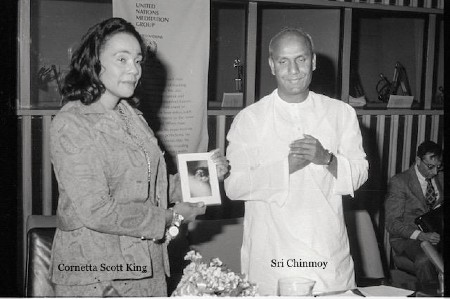Recently, at a program, organized by Nayana Hein and hosted by the Sri Chinmoy Centre at its Headquarters in Queens, New York, Dr. Martin Luther King’s spirit of brotherhood, his life and his ongoing legacy were honored in a performance featuring a new arrangement of the “I Have a Dream” song. The program was presented by a diverse group of Sri Chinmoy’s students from various parts of the globe, such as, the Caribbean (including Puerto Rico); Africa, South East Asia; Europe; and, of course, the USA. This group was representative of Dr. King’s dream of unity and equality for all.
 In 1977, words from Dr. Martin Luther King’s “I Have a Dream” speech were set to music by the philosopher, yogi, and ambassador-of-peace, Sri Chinmoy, who in 1970, at the invitation of U Thant, then Secretary General of the United Nations, began holding peace meditations for members and staff at the UN. The group eventually became known as Sri Chinmoy: The Peace Meditation at the United Nations. These meditations have been a source of inspiration-sponsoring events such as the 1977 program wherein the song first premiered, with Coretta Scott King as guest of honor and keynote speaker. Dr. King’s visionary words along with Sri Chinmoy’s melody resonated with a unanimous message of unity, togetherness and equality.
In 1977, words from Dr. Martin Luther King’s “I Have a Dream” speech were set to music by the philosopher, yogi, and ambassador-of-peace, Sri Chinmoy, who in 1970, at the invitation of U Thant, then Secretary General of the United Nations, began holding peace meditations for members and staff at the UN. The group eventually became known as Sri Chinmoy: The Peace Meditation at the United Nations. These meditations have been a source of inspiration-sponsoring events such as the 1977 program wherein the song first premiered, with Coretta Scott King as guest of honor and keynote speaker. Dr. King’s visionary words along with Sri Chinmoy’s melody resonated with a unanimous message of unity, togetherness and equality.
During the ceremony Mrs. King noted of her husband, “…His religion was not really the religion of the West. He embraced Christianity, which is a [Middle] Eastern religion, and he took that religion seriously. He said, ‘I receive my inspiration from Christ and the techniques from Mahatma Gandhi,’ so that he was first of all a spiritual leader, and the movement that he led in America, in the South, was essentially a spiritual movement…We have different labels for our God, but when we discover love and embrace it, we’ve discovered God.”
In her closing remarks Coretta Scott King thanked Sri Chinmoy, Sri Chinmoy: The Peace Meditation at the United Nations, and the many ambassadors and UN officials who paid tribute to her husband: “Your words have, indeed, been an inspiration to me. And to have heard what has been said by representatives of nations around the world, who have understood Martin Luther King, Jr.’s message and his great life commitment, certainly inspires me personally to continue in the struggle, which we are all a part of here….I feel that I am also a citizen of the world, as Martin Luther King, Jr. was a citizen of the world.”
As noted by Dr. Ganapati John Coleman, Mrs. King’s remarks in 1977 reflected the centrality of spirituality in the success of the movement. The founding principles on which the movement was based were both Christian and Asian Indian i.e., Buddhist, Hindu, and Jain. These principles were the intertwining of love, truth, non-violence and civil-disobedience, to produce an American Gandhism. Little known to many today, is the number of leaders of the movement who actually spent time in India studying Gandhi’s principles at the source. This includes Dr. Martin L. King, Coretta S. King, Rev. James Lawson, among others.
It is also worth noting that Gandhi’s India was also to benefit from Black America through the correspondence between him and George Washington Carver, an Agriculturalist at Tuskegee Institute, who had developed techniques in crop rotation and other methods for increasing agricultural yield. It is this unity, this togetherness, this sharing of knowledge and understanding that, like Gandhi and Carver, can brings us together and replace problems with solutions; for one person or one group does not have all of the answers. This is what great leaders aspire to achieve—unity toward mutual understanding—progress! Each culture, each group, has something to offer if we can just listen and seek out what brings us together as opposed to what tears us apart.
A new interpretation and partial reimagining of Gandhi’s principles, based on the philosophy of Sri Chinmoy, are part of a new book to be published this year by his Black students and Editor-in-Chief, Dr. Ganapati John Coleman. The book, “He Touched Our Hearts, He Touched Our Lives: An Exploration of the Philosophy of Sri Chinmoy as Applied to the Struggle for Freedom, Justice, and Equality in America and Beyond” is a unique and insightful exploration of the possibilities unleashed through the blending of Eastern and Western thought and spirituality, that can help America in the process of reinventing itself, yet again. Let us all celebrate Black History Month, together, with the poignant words of Dr. King and the soul-stirring melody of Sri Chinmoy’s, “I Have a Dream” song.
Video of the performance is available here:


